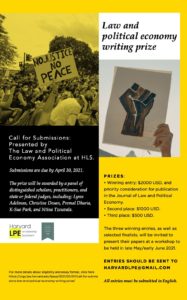The Harvard Law School Political Economy Association is delighted to announce the winners of the first Law and Political Economy Writing Prize. We were honored to receive so many exceptional papers, and look forward to many more valuable contributions to the field of law and political economy from all of the entrants.
First Place:
Hayley Hahn, University of Virginia (JD)
Stripping the Gears of White Supremacy: A Call to Abate Reliance on Court Fines & Fees and Revitalize State and Local Taxation
“A creative and moving argument that demonstrates linkages between the two different fiscal fields of court fines and local taxation. The paper sets out a compelling narrative about the aggregate drama driving distributive inequality, as well as positioning itself in dialogue with the broader project of law and political economy scholarship.”
Second Place:
Daniel Epstein, University of Chicago (PhD)
Commodified Justice and American Penal Form
“This paper shows remarkable sophistication, complexity and clarity of thought. The author draws elegantly on both theories of the commodity form and contemporary scholarship on incarceration to illustrate the transformation of liberal thinking on justice under the conditions of American capitalism.”
Third Place:
Paniz Khosroshahy, University of Toronto (JD)
Feminist Governance in the Neoliberal University: On the Non-Performativity of Sexual Violence Policies
“This paper draws on feminist thought and scholarship to make a powerful structural critique of campus policies on sexual violence. By highlighting how law and policy operate to displace different forms of institutional politics and solidarity, it demonstrates the power of following law and political economy critiques into new sites and terrains.”
Honorable Mention (alphabetical order):
- Juan Auz, Hertie School (PhD) – ‘So This is Permanence’: The Inter-American Human Rights System as a Liminal Space for Climate Justice
- Barbora Cernusakova, University of Manchester (PhD) – Roma workers in Czech racial capitalism: A post-socialist case study
- Elliot Mamet, Duke University (PhD) – “This Unfortunate Development”: Incarceration and Democracy in W.E.B. Du Bois
- Kellen McCoy, Penn Law (JD) – COVID-19, Cost-Shifting, and Independent Contractors: The Worrying Implications of Company COVID-19 Policies
- Maayan Niezna, University of Kent (PhD) – Entry Fees: Non-citizen Workers, Debt and Gate-Keepers
- Gali Racabi, Harvard Law School (SJD) – Abolish The Employer Prerogative, Unleash Work Law
- Chris Yarrell, UVA (JD) – The Emperor Still Has No Clothes: Revisiting Rodriguez And The Federal Role In Education
